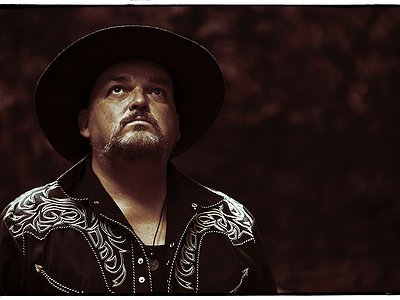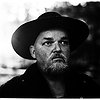Part 2
Could you take us through a day in your life, from a possible morning routine through to your work? Do you have a fixed schedule? How do music and other aspects of your life feed back into each other - do you separate them or instead try to make them blend seamlessly?
I’m very much attuned to when the inspiration strikes; I kind of wait for it as it were. Once it hits I most likely will finish it. My solo albums are like that; written and recorded in a few days. I don’t really have a schedule except when I’m producing of course, then I prepare as much as possible and just flow with the artist’s schedule.
Could you describe your creative process on the basis of a piece or album that's particularly dear to you, please? Where did the ideas come from, how were they transformed in your mind, what did you start with and how do you refine these beginnings into the finished work of art?
Hum was created in sequence. I had been badly ill in bed for a couple months and built up this insane energy and need to create an album. I started with an arpeggiated chordal sequence that I had written with my Portuguese guitar, laid that down, then wrote the melody and lyrics, recorded those, then added textures and more instrumentation. This, I knew, would be the first song on the album. Each day I wrote and recorded the next song imagining listening to the album and what would come next. I work well with not over-thinking and just trusting and improvising. I listen to my gut instinct about what kind of sound it should be and playing to create the atmosphere needed for this piece of music etc.
In the past, I have taken more time to refine and develop and change and rewrite and demo and re-demo but in the end, it has never given me that powerful feeling of the original quick recording on a tape recorder or voice memo. Natasha and I in Eleven would often find ourselves going into the studio with only one or two songs ready and trusting the rest would come lol. I guess that’s when it started this approach.
There are many descriptions of the ideal state of mind for being creative. What is it like for you? What supports this ideal state of mind and what are distractions? Are there strategies to enter into this state more easily?
For me it’s the ache or need to communicate a feeling powerful and deep within me that needs release. I have done this in deep grief and music is the only way I know to express this. As well as deep joy. The distractions disappear in this state. Like I said before, it feels like it calls me and takes over. I can’t will it to happen.
How is playing live and writing music in the studio connected? What do you achieve and draw from each experience personally? How do you see the relationship between improvisation and composition in this regard?
There is an aspect of both improvisation and composition, which I guess in my case, I imagine the composition is a sort of mild conscious guiding of the improvisation? It’s hard to describe exactly, because being on stage or in the studio is kind of an out-of-time experience where I do the least thinking.
How do you see the relationship between the 'sound' aspects of music and the 'composition' aspects? How do you work with sound and timbre to meet certain production ideas and in which way can certain sounds already take on compositional qualities?
Sound to me, is part of the composition. It often moves or inspires a certain melody, creating a mood that feels like it’s part of the inner logic or the world the composition exists in. Whenever I get a new instrument and start to learn and experiment with it, what comes out of me is often surprising and unexpected like the sound is drawing out something new.
Eventually it becomes second nature to decide what kind of textures are needed for a particular piece of music. Some might be traditionally used for the purpose intended, others can be wonderful and work well even though it’s not the usual usage. For example, a bowed banjo tuned in root fifths has a sort of medieval/pagan or hurdy-gurdy feeling. It’s so much fun to experiment with unusual approaches and techniques. Flute with the head removed and played like a trumpet sounds very Duduk-like.
Our sense of hearing shares intriguing connections to other senses. From your experience, what are some of the most inspiring overlaps between different senses - and what do they tell us about the way our senses work? What happens to sound at its outermost borders?
Sound can be so visual to me; not only in its physical depths but also in respect to more abstract qualities like warmth, coldness, anger etc.
It can have texture like rough, cutting, smooth, liquid as well. It exists internally and externally. It physically vibrates in us. The feeling of singing or playing saxophone or a cello resonates through our bodies. We can imagine music and it’s almost as real as hearing it. I often hear music in my dreams and have tried to hold on to it as I wake. Sometimes it works.
Art can be a purpose in its own right, but it can also directly feed back into everyday life, take on a social and political role and lead to more engagement. Can you describe your approach to art and being an artist?
Creating music and helping others create it, as well as playing live alone or with others is the most connected, alive and at peace I feel. I use it to communicate my experiences what it feels like to exist, to struggle, to love, to feel a part of nature and all living things. It’s a sacred place and state of being when you lose yourself in it.
It is remarkable, in a way, that we have arrived in the 21st century with the basic concept of music still intact. Do you have a vision of music, an idea of what music could be beyond its current form?
It’s been around from the beginning. It’s in nature and in us and as long as we are here we will make music. Its essence won’t change, but as to what forms it might take I can’t really predict.






